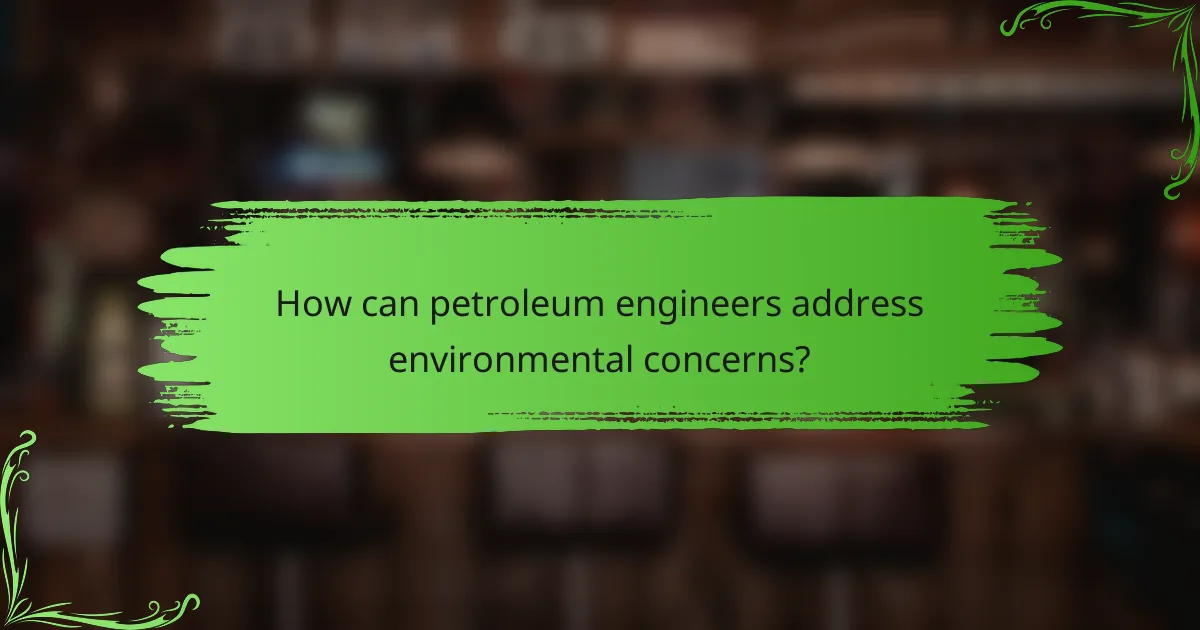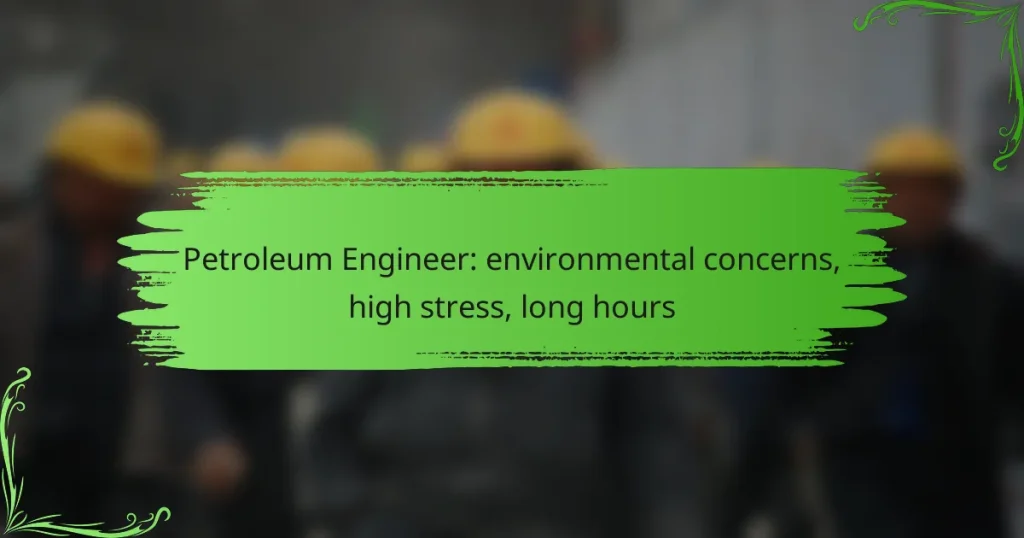Petroleum engineers play a crucial role in addressing environmental concerns by implementing sustainable practices and advanced technologies to reduce the ecological impact of oil and gas extraction. However, the profession is often accompanied by high stress due to demanding decision-making, long project timelines, and the necessity of working in remote locations. Additionally, while many engineers work a standard 40-hour week, project demands can lead to extended hours and on-call responsibilities, adding to the challenges they face in their careers.

How can petroleum engineers address environmental concerns?
Petrroleum engineers can address environmental concerns by integrating sustainable practices, utilizing advanced technologies, and conducting thorough environmental assessments. These strategies help minimize the ecological impact of oil and gas extraction while promoting responsible resource management.
Implementing sustainable practices
Implementing sustainable practices involves adopting methods that reduce waste and conserve resources. This can include recycling water used in extraction processes and minimizing land disruption during drilling operations. Engineers should also consider the lifecycle of projects to ensure sustainability from planning to decommissioning.
For example, using renewable energy sources to power drilling rigs can significantly lower carbon emissions. Additionally, engaging in responsible sourcing of materials can further enhance sustainability efforts.
Utilizing advanced technologies
Advanced technologies play a crucial role in addressing environmental concerns in petroleum engineering. Techniques such as enhanced oil recovery (EOR) and digital monitoring systems can optimize extraction while reducing environmental footprints. These technologies allow for more efficient resource use and lower emissions.
For instance, real-time data analytics can help identify leaks or inefficiencies in operations, enabling prompt corrective actions. This proactive approach not only protects the environment but also enhances operational efficiency.
Conducting environmental impact assessments
Conducting environmental impact assessments (EIAs) is essential for understanding the potential effects of petroleum projects on ecosystems and communities. EIAs help identify risks and inform decision-making by evaluating factors such as air and water quality, wildlife habitats, and community health.
Petroleum engineers should collaborate with environmental scientists to ensure comprehensive assessments. This collaboration can lead to better mitigation strategies and compliance with local regulations, ultimately fostering community trust.
Engaging in community outreach
Engaging in community outreach is vital for building relationships and addressing public concerns regarding petroleum projects. Effective communication with local communities can help mitigate fears and misunderstandings about environmental impacts.
Petroleum engineers should organize informational sessions and workshops to educate the public on safety measures and environmental initiatives. This transparency can lead to greater community support and collaboration in environmental stewardship efforts.
Adopting cleaner extraction methods
Adopting cleaner extraction methods is a key strategy for reducing the environmental impact of petroleum engineering. Techniques such as hydraulic fracturing with less harmful additives and improved drilling practices can minimize pollution and resource depletion.
For example, using closed-loop systems can prevent spills and reduce water usage. Engineers should continuously evaluate and implement best practices to ensure that extraction methods align with environmental protection goals.

What are the stress factors in petroleum engineering?
Petroleum engineering involves several stress factors that can impact professionals in the field. Key challenges include high-pressure decision-making, long project timelines, remote work locations, and stringent safety and regulatory compliance.
High-pressure decision-making
Petroleum engineers often face high-stakes situations where quick and accurate decisions are crucial. These decisions can affect project outcomes, safety, and financial investments, leading to significant stress. Engineers must balance technical data with practical considerations, often under tight deadlines.
To manage this stress, engineers should develop strong analytical skills and decision-making frameworks. Utilizing simulation tools and data analytics can help in making informed choices, reducing the pressure during critical moments.
Long project timelines
Projects in petroleum engineering can span several months to years, which can lead to prolonged stress. Engineers must maintain focus and motivation over extended periods, often dealing with changing project scopes and unforeseen challenges. This can create a sense of uncertainty and pressure to meet deadlines.
To cope with long timelines, setting clear milestones and regular check-ins can help maintain progress and morale. Breaking projects into manageable phases allows for more achievable goals and reduces the feeling of being overwhelmed.
Remote work locations
Many petroleum engineers work in remote locations, which can lead to feelings of isolation and increased stress. The physical distance from family and friends, combined with challenging living conditions, can impact mental well-being. Engineers may also face difficulties in communication and collaboration with team members.
To mitigate these effects, maintaining regular communication with support networks and utilizing technology for virtual connections can help. Engineers should also prioritize self-care and seek out local resources to enhance their living conditions while on-site.
Safety and regulatory compliance
Ensuring safety and adhering to regulatory standards is a critical aspect of petroleum engineering that adds to stress levels. Engineers must stay updated on regulations and implement safety protocols to prevent accidents and environmental damage. This responsibility can weigh heavily on professionals, especially in high-risk environments.
To navigate these challenges, engineers should engage in continuous training and education on safety practices and compliance standards. Developing a proactive safety culture within teams can also alleviate some stress by fostering a shared commitment to safety and accountability.

What are the typical work hours for petroleum engineers?
Petroleum engineers typically work a standard 40-hour week, but their hours can vary significantly depending on project demands and operational needs. Many engineers may face extended hours and on-call responsibilities, especially during critical phases of projects.
Standard 40-hour work weeks
In a typical setting, petroleum engineers work around 40 hours per week, often from Monday to Friday. This schedule allows for a balanced work-life dynamic, especially in office-based roles or during the planning stages of projects.
However, the standard hours can be influenced by company policies and specific job roles. Engineers involved in research or development may have more flexible hours compared to those on-site at drilling locations.
Extended hours during projects
During active projects, especially those involving drilling or production, petroleum engineers may work significantly longer hours. It is common for engineers to put in 50 to 70 hours per week during critical phases, such as site evaluations or equipment installations.
These extended hours are often necessary to meet project deadlines and ensure safety and efficiency. Engineers should be prepared for this intensity and manage their time effectively to avoid burnout.
On-call responsibilities
Many petroleum engineers have on-call duties, which means they must be available outside of regular working hours to address urgent issues or emergencies. This can include responding to equipment failures or safety incidents at drilling sites.
Being on-call can add stress and unpredictability to an engineer’s schedule. It is essential for professionals in this field to establish clear boundaries and communication with their employers regarding on-call expectations to maintain a healthy work-life balance.

How does the job market look for petroleum engineers in the US?
The job market for petroleum engineers in the US is currently favorable, driven by a mix of traditional oil and gas demand and a growing focus on renewable energy. Opportunities are expanding as companies adapt to environmental concerns and seek innovative solutions in energy production.
Growing demand in renewable energy sectors
As the energy landscape shifts, petroleum engineers are increasingly sought after in renewable energy sectors. Their expertise in resource management and engineering principles applies to fields like geothermal energy, biofuels, and carbon capture technologies.
Many companies are investing in sustainable practices, creating roles that blend traditional petroleum engineering skills with environmental stewardship. This trend is likely to continue as regulations tighten and public interest in clean energy rises.
Competitive salaries and benefits
Petroleum engineers enjoy competitive salaries, often ranging from the high $80,000s to well over $150,000 annually, depending on experience and location. Benefits typically include health insurance, retirement plans, and performance bonuses, making these positions attractive.
In addition to base salaries, many companies offer perks such as relocation assistance and educational reimbursement, further enhancing the overall compensation package for petroleum engineers.
Job security in established companies
Job security for petroleum engineers tends to be higher in established companies that have weathered market fluctuations. These firms often have the resources to invest in new technologies and adapt to changing energy demands.
While the industry can experience volatility, engineers with strong skills and a focus on sustainability are likely to find stable employment. Networking and continuous education can also enhance job security in this evolving field.

What skills are essential for success in petroleum engineering?
Essential skills for success in petroleum engineering include strong analytical abilities and proficiency in engineering software. These skills enable engineers to solve complex problems, design efficient systems, and ensure compliance with industry standards.
Strong analytical skills
Strong analytical skills are crucial for petroleum engineers as they must interpret data from various sources, including geological surveys and production reports. This involves evaluating complex information to make informed decisions about drilling locations, extraction methods, and resource management.
Engineers often use statistical analysis to assess risks and predict outcomes, which helps in optimizing production and minimizing environmental impacts. Developing these skills can involve practical experience, coursework in mathematics and statistics, and familiarity with data analysis tools.
Proficiency in engineering software
Proficiency in engineering software is vital for petroleum engineers to design, model, and simulate drilling operations. Commonly used software includes reservoir simulation tools and geological modeling applications, which help in visualizing subsurface conditions and predicting oil and gas behavior.
Familiarity with software such as MATLAB, AutoCAD, and specialized petroleum engineering programs enhances an engineer’s ability to perform calculations efficiently and accurately. Continuous learning and staying updated with the latest software advancements are essential to maintain a competitive edge in the field.


